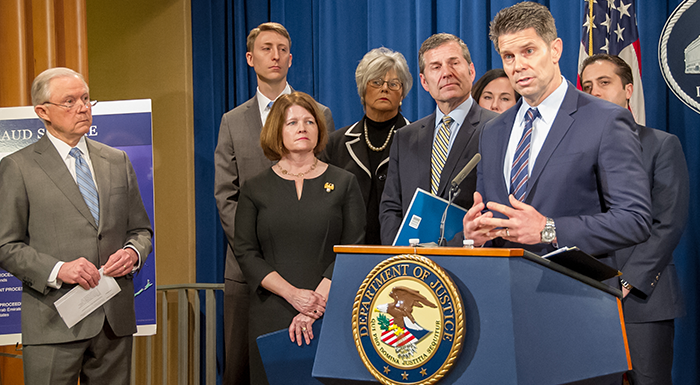Photo Courtesy of FBI
FBI Acting Deputy Director David Bowdich delivers remarks on Thursday at press conference announcing elder fraud charges.
By Forum Staff
More than 250 suspects from around the world found themselves in cuffs last Thursday following the largest coordinated sweep of elder fraud cases in recorded history, according to U.S. Attorney General Jeff Sessions.
The cases include criminal, civil, and forfeiture actions across that victimized more than a million Americans in every state, most of whom were elderly. In total, the charged elder fraud financial schemes caused losses of more than half a billion dollars, Sessions noted.
“Today’s actions send a clear message: We will hold perpetrators of elder fraud schemes accountable wherever they are,” the attorney general added. “When criminals steal the hard-earned life savings of older Americans, we will respond with all the tools at the department’s disposal – criminal prosecutions to punish offenders, civil injunctions to shut the schemes down, and asset forfeiture to take back ill-gotten gains. Today is only the beginning. I have directed department prosecutors to coordinate with both domestic law enforcement partners and foreign counterparts to stop these criminals from exploiting our seniors.”
According to DOJ, the actions charged a variety of fraud schemes, ranging from mass mailing, telemarketing and investment frauds to individual incidences of identity theft and theft by guardians. A number of cases involved transnational criminal organizations that defrauded hundreds of thousands of elderly victims, while others involved a single relative or fiduciary who took advantage of an individual victim. The schemes charged in these cases caused losses to more than a million victims.
Some examples of elder financial exploitation include:
• “Lottery phone scams,” in which callers convince seniors that a large fee or taxes must be paid before one can receive lottery winnings;
• “Grandparent scams,” which convince seniors that their grandchildren have been arrested and need bail money;
• “Romance scams,” which lull victims to believe that their online paramour needs funds for a U.S. visit or some other purpose;
• “IRS imposter schemes,” which defraud victims by posing as IRS agents and claiming that victims owe back taxes;
• “Guardianship schemes,” which siphon seniors’ financial resources into the bank accounts of deceitful relatives or guardians.
The Federal Bureau of Investigation noted on Thursday that, last year, it opened more than 200 financial crime cases that involved elderly victims. The investigations covered a range of crimes, from investment frauds to reverse mortgage scams. Often, the cases involved “outright theft by people the victim should have been able to trust, to include their attorneys, financial advisers, and, even more egregious, their guardians and caregivers,” said FBI Acting Deputy Director David Bowdich. “These fraudsters view our seniors as prime targets.”
Many senior citizens have large nest eggs saved over decades, Bowdich noted. At the same time, they may not be technologically savvy. The scammers also know that elderly victims often don’t report being victimized either because they feel guilty or embarrassed, “or because they don’t even realize they are being scammed.”
The outcome is heavy toll on the targets, Bowdich acknowledged.
“We understand how devastating a fraudulent scheme against elderly victims can be, not just financially, but emotionally, mentally, and even physically,” he said.

